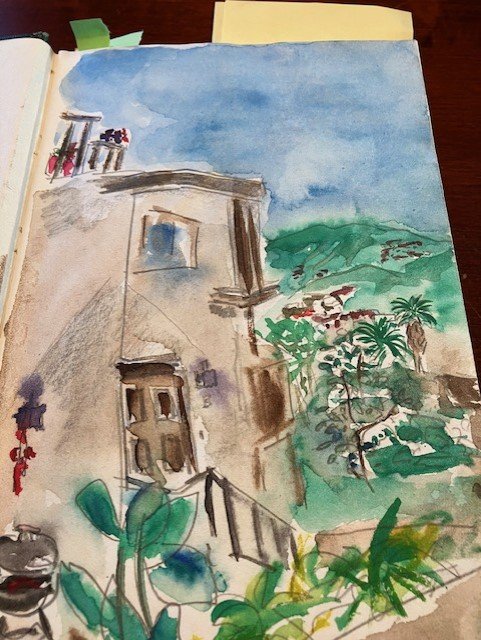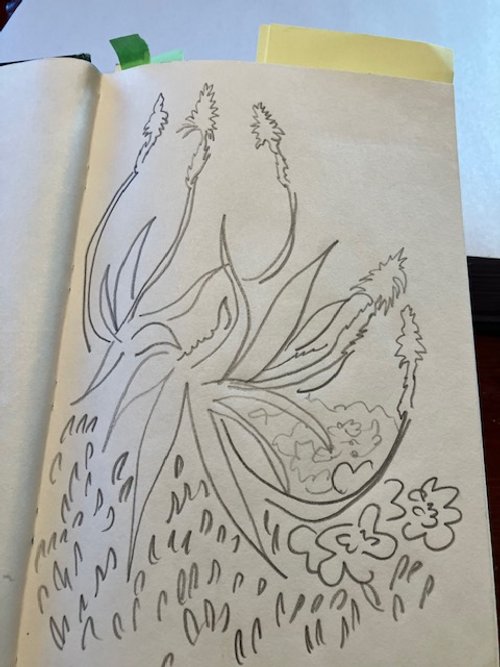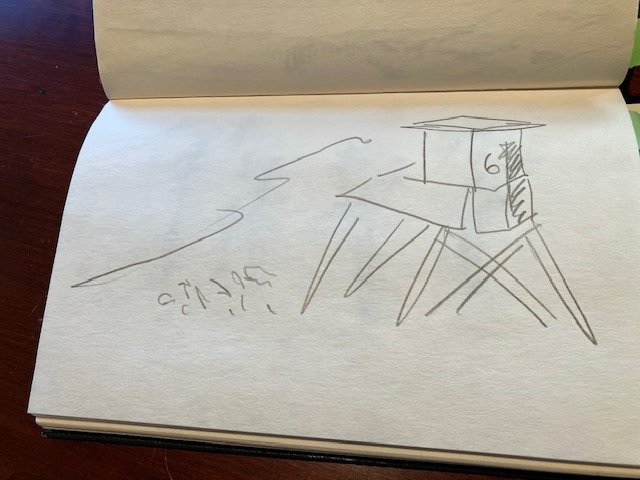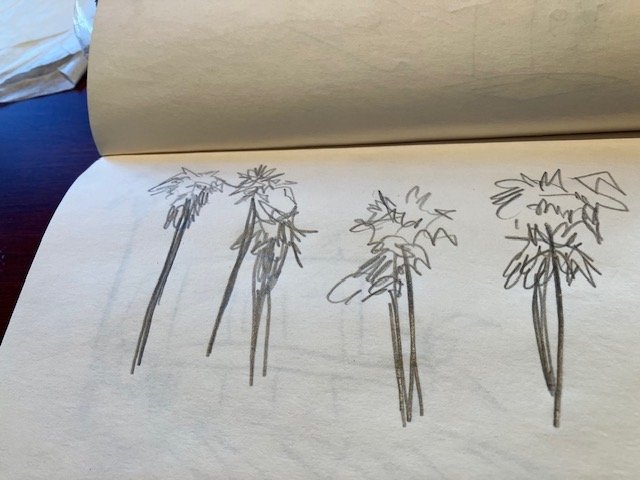Claiming Responsibility by Paul Marion (c) 1983, 2023
My apartment on Seville Place in Dana Point, looking south to San Clemente
In 1983-84, I lived in Dana Point, California, while enrolled in the Master of Fine Arts in Writing Program at the University of California, Irvine. I kept a diary on-and-off while in school. The following are entries related to what was going on in the world, especially hostilities in the Middle East, and my daily life with friends and on campus. Today, I was struck by the fact that 40 years later the pain and misery continue in Israel, Gaza, Lebanon, the West Bank, the whole region on the edge of wider violence. I was one person in California paying attention to the world. I don’t know why I was compelled to catalogue what I was seeing and doing. How much can be learned from accounts by persons not on the dangerous front lines? I saved the diary and share it here. The cliché may apply: The more things change, the more they stay the same. For my entire adult life the turmoil in the Middle East has been a background narrative. I’m posting this on October 27, 2023.—PM
October 23, 1983
In Beirut, Lebanon, 241 American marines, sailors, and soldiers and 55 French paratroopers and several civilians were killed in two suicide truck bombings of their military stations. An organization, Islamic Jihad, opposed to the international peacekeeping forces in Lebanon, claimed responsibility.
October 25
The United States, assisted by troops from several Caribbean nations, invaded the island of Grenada to rescue a group of medical students and disrupt a military government that had seized power unlawfully from a civilian administration. That’s the explanation from Washington, D.C. At the beach, a Marine Corps jet whined, its slant chalk scratch on an otherwise flawless ceiling. Even L.A.’s smog blew off with the night desert winds. Scruffy palms, roasting, outnumbered the faithful at noon. Two bathers treaded, light in the heave and slide, beyond the break. Hissing foam sucked back through the stones.
Tropical plant, Dana Point
November 29
A jawbone frames the laboratory door. Each winter, California grays plunge and run, and laden watch-boats head out to spot a fluke, a spray, any sign in the blue. This taking account, this need to see, runs in us like the urge pushing giants south to calving lagoons. The totem is painted, carved, printed in the Orange County Marine Institute, where bones of a whole creature float over the murmuring aquariums, the ribs arching even the town this festive week while the big mammals, as they have for ages, slide by the chaparral bluffs from which men once scaled cow hides down to the beach for traders whose Boston ships worked this coast.
December 3
At the bottom of Seville Place near the Dana Point Nursery, the tops of palm trees shaped like pineapples rippled in the breeze when I turned up the hill towards home tonight with my car window down.
Dec. 4
I’m up early with Sunday morning radio news from San Diego, sky blue after a day’s rain, sun shimmery through dripping windows. Washed, dressed in green corduroy pants, old baseball undershirt, sneakers, National Park cap, jacket with big pockets for postcards, ballpoint pen, and keys to lock the glass entrance behind me on my way to the Stop & Go for the L.A. Times wrapped in funnies. Weather was warm and clear as I walked the west side of Pacific Coast Highway past an Italian restaurant and a store selling three-wheeled vehicles, TriHawks. From the overlook above the marina, in the silver-blue metal-flake bay a few boats turned out to sea and a long canoe with four guys stroking glided into shore. I pulled the Arts & Books section from the newspaper log.
In the news—today, for the first time, 28 U.S. war planes bombed Syrian positions in Lebanon in retaliation for anti-aircraft fire taken by U.S. reconnaissance flights this week. “Our mission in Lebanon is unchanged,” says the White House spokesman. The U.S. lost two planes. Navy ships shelled Lebanese sites. Eight Marines were killed by Druze militia firing artillery in Beirut in unrelated action.
Dec. 5
A car bomb destroyed a Beirut apartment building. No motive has been established, according to American journalists. But what do the residents know? No group has claimed responsibility. Rescue workers sorted through rubble for bodies.
Dec. 6
I stopped in Laguna Beach and San Juan Capistrano, shopping for gifts and roaming around. It’s odd to see a person in shorts next to another wrapped in a parka. The ever-blooming flowers astound me. Dana Point’s Post Office window shows a snowy scene—the idealized Christmas from northern Europe is white. Claus has boots and sleigh not a surfboard and shades.
In Jerusalem, a bus was blown up. Two rival factions of the Palestine Liberation Organization claimed responsibility reported our National Public Radio. A photographer who saw the blast described persons left sitting in their seats, blood on the faces, too stunned to move after the roof was torn off. Four killed, 43 injured.
Dec. 7
Syrian troops turned over the body of a U.S. pilot to Lebanese soldiers who then transferred the corpse to the Marines. The pilot was pulled from his downed jet this weekend and later died of his wounds. Another airman was captured; Syrians won’t release him until the U.S. military leaves Lebanon.
Dec. 8
A spot in the brain like a tooth cavity, rotted by TV and pop culture garbage.
Dec. 10
“All that’s left is what’s in my head.” (words of an elderly Kentuckian)
Dec. 12
Turned in the final grades for my first-year writing course today. All but one of my 24 students passed. I spent the afternoon with Diana in Costa Mesa. Yesterday, with Dana and Shawn of the writing workshop, I visited Juan, also from the workshop, and his wife Jean in Riverside. We ate a tasty meal of chicken taquitos, guacamole, chips, salsa, and tortillas and drank ice-cold Oregon beer while watching the Cowboys-Redskins football game on TV. Later, we picked oranges from trees along their driveway. The oranges are lightbulbs in among dark green leaves. Juan rigged a wire coat hanger to a broom handle for a picker.
Dec. 13
U.S. naval guns shelled positions in the Lebanese hills where someone had fired at an American reconnaissance plane again. A destroyer and a guided missile cruiser responded.
“There’s an old Chinese tradition that poets put their shoulders to the wheel and do a little work with the Administration every once in a while. . . . We may blow it, but the greater processes of the universe are not going to be troubled by the mistakes we make.”—Gary Snyder on “All Things Considered” (National Public Radio)
Dec. 14
Evening out with relatives to celebrate Uncle Charles’ birthday at the Hungry Tiger in Corona del Mar where Diana works.
This past weekend, several car bombs exploded at sites in Kuwait, one at the United States Embassy. People were killed and wounded. The Islamic Jihad (Holy War) group claimed responsibility. There was one suicide attack like the attack on the Marines’ barracks in Beirut last October in which more than 200 Americans died. Other car bombs were triggered by remote control.
Again, U.S. ships bombarded anti-aircraft positions in the hills around Beirut, 70 rounds fired. The 16-inch guns on the battleship New Jersey unleashed shells that weigh up to one ton for 23 miles and which can devastate an area a quarter of a mile square. The largest guns in the U.S. fleet, they could launch a Volkswagen Beetle onto a selected tennis court very far away.
Israeli gunboats fired on the PLO in Tripoli.
The U.S. President said the Marines would be pulled out of Lebanon if the political order collapsed.
The cycle of retaliation. Escalation of hostilities.
Dec. 15
After being fired upon at dusk, Marines fired small arms and tank cannon at positions in no-man’s land between rival factions’ territory.
Dec. 16
I went to the Laguna Beach Library to hear author Meridel Le Sueur read from her work and talk about writing and society.
“Not one boy whom I knew who went to the First World War returned.”
“Your shit’s gonna fall on you.”
“All serious workers are prophets and contain and preserve the future.”
“Alienation causes a paralysis that shows up in our response to the Bomb.”
“To make a distinction between prose and poetry is bourgeois whimsy.”
“Nature is cyclical.”
Dec. 17
I watched the Parade of Boats in Dana Point Harbor. The boats rigged with Christmas lights looked like big floating Xmas trees because the hulls were barely visible against black water.
Dec. 19
The water man stopped the Sparkletts truck near a eucalyptus tree and stepped down, his lemon-lime uniform glowing, the tanned face whitening a smile, matching the look on the woman in her yard, red shirt tucked into silver gym shorts. She’d been in a crouch, painting a chair, and stood up to see. The water man, who didn’t have a cap on his blond head, walked to the side of the truck and lifted out a large, clear plastic jug. In one motion he swung it onto his shoulder and turned toward the house. The truck was filled with these vessels, each with a sky-blue plastic seal. The back panel of the vehicle, all green and yellow fish scales, shimmered.
Lifeguard station, Capistrano Beach
Jan. 2, 1984
80 degrees. Easing into the new year after a two-day party upstairs in my landlord’s part of the house. All kinds of entertainment and opportunities. Blue leaking through window blinds this morning. Hello California!
Jan. 3
The Syrian government released the captured U.S. airman Robert Goodman after a personal appeal by Reverend Jesse Jackson, a candidate for the U.S. Presidency.
Fabulous winter weather. Catalina Island visible from the Coast Highway, the local slopes brilliant green, tree-less.
Jan. 17
“A writer is like a surgeon. If he opens up a body and finds an abscess, he has to remove it.”
—Philip Roth
Jan. 20
Holy Ghost at Capo Beach. The padre in a black jersey and
black pants rolled to his knees walks up the beach towards me, and the couple
he had embraced in the water now stands in fog that could be souls.
Jan. 25
One thousand persons attended a poetry reading at the Huntington Library in San Marino, which was sponsored by the Academy of American Poets. Reading their work were Josephine Miles, William Stafford, Mark Strand, and David Wagoner. Before the event, Maria from the workshop and I looked at the rare books and manuscripts on display, some of which had been handled 500 years ago. Of all the words and images given to us, the stickiest image for me is from a Stafford poem in which he describes the fields, the open unfenced fields, along the northern border of the U.S. and Canada as a peace monument.
Jan. 26
Birthday #30. Made it this far.
“I don’t feel old. I feel like a young guy something’s happened to.”—Mickey Spillane
Jan. 27
Palm trees, Dana Point
Capistrano Beach. Capo Beach, the locals say. Heat like a gift at the end of January. A beautiful, darkly tanned young woman, lying on a towel, talks with two friends. She’s wearing turquoise bits of cloth. Midday light sparkles on blue-gray sea flats. Small waves keep time. Behind us, above the cliff, the smoke of a brush fire fades.
Jan. 28
“Poetry is made out of words and time.”—Charles Simic
March 30
I visited Juan and Jean at their home in La Sierra, near Riverside. After a “ranchero” breakfast of eggs and tortillas fixed by Juan, he and I made the rounds of used bookstores in Riverside and San Bernardino. In Riverside we stopped at the Mission Inn, an historic landmark that is a marvel of old California architecture. The sprawling, multi-storied building is a hotel-resort-shopping plaza-chapel and more. Courtyards, spiral staircases, tiled domes and patios, a swimming pool, old bells, narrow balconies, and an array of plants and trees. It looks like Mexico and Spain, and there’s an Asian section, too. A fascinating structure.
The day was bright and warm with puffy clouds. Riverside is the low desert. Dry hills and mountains, brown and tan, loom in the distance. Juan and I checked out three stores, looking for used poetry books. The store in Riverside had a few interesting things, including a copy of Michael McClure’s Scratching the Beat Surface: Essays on New Vision from Blake to Kerouac. McClure, always aware of his mammal nervous system, writes about art as “a living bio-alchemical organism.” The guy at the counter was slipping porno magazines into plastic bags when we walked out.
We headed to San Bernardino, more of a low middle-class community. In the section of town we rode through, Latino and Black kids walked the streets. Juan recognized a young guy who plays on the UC Irvine basketball team. Growing up, Juan played lots of hoop—one of the kids he played against was Ronnie Lott, now a defensive back for the San Francisco 49ers. Juan’s about my size but in solid shape. He wrestled in high school and was a regional champion.
At one bookstore I was tempted to buy a copy of Ovid’s Poems but put it back and made a note to get it at the library. In Art’s Book Shop on West Base Line Street, run by a Mexican American woman, I picked up an old paperback copy of Kerouac’s Big Sur for 35 cents, 38 cents with tax. How do these shop owners make money? Juan, who also paints and does other visual art, bought a few art books with color reproductions and a slightly used paperback foreign edition of Dubliners by James Joyce.
Around 3:30 p.m., we were burnt out on bookstores and returned home where Jean was preparing an unusual (to me) pasta dish. She used her mother’s Italian recipe, which called for bacon, eggs, cheese, parsley, and other ingredients. The result is a tasty Spaghetti alla Carbonera, a change from the standard tomato sauce-covered spaghetti and a world better than canned Franco-American Spaghetti of my childhood. We drank Lambrusco and bottles of Oregon beer to top off a good day. It took me about an hour-and-a-half to get back to Dana Point. All the way I listened to the Dodgers-Angels ballgame, called the Freeway Series here, the last pre-season game.



